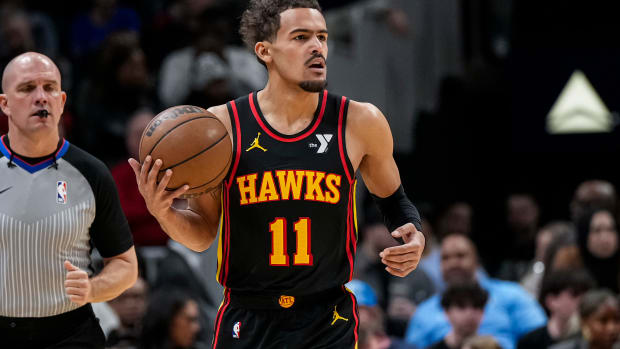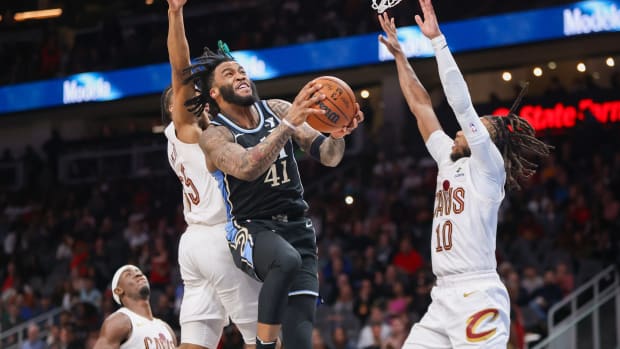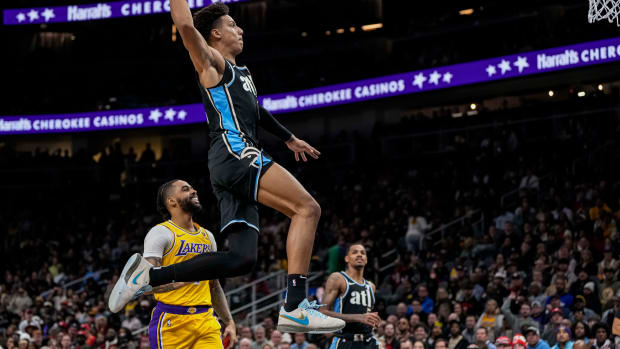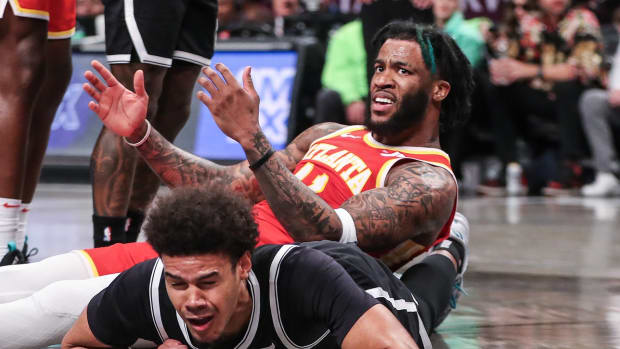Travis Schlenk Discusses Draft, Free Agency Ahead of Crucial Offseason
The Hawks have a pivotal offseason ahead of them, the weight of which is not lost on Travis Schlenk. After the 2019-20 season went off the rails, the Hawks’ General Manager is determined to reverse the team’s trajectory and put Atlanta in position to make a significant leap in 2021. “I do anticipate us being a little more assertive in free agency,” Schlenk told Chris Kirschner of The Athletic and Sarah Spencer of the Atlanta Journal-Constitution on Monday.
Perhaps the most notable piece of information to come from the interview is that the Hawks plan on keeping their pick in the upcoming NBA Draft -- whenever that takes place. “I think we’re committed to it,” Schlenk said. “Obviously our pick is going to be a top-10 pick, so obviously we’ll keep that, unless some great offer came our way, something we couldn’t turn down. But as of right now, those dialogues aren’t taking place.”
Many experts and decision-makers around the NBA view this as a weak draft without much star talent at the top. For a team like Atlanta, who wants to make the huge leap from bottom-three team to playoff contender, the best course of action might be trading what could be a top-three pick for a future asset and rotation player capable of helping the team right away. That strategy could always change, and if the Hawks are planning on trading their pick, it wouldn’t be wise of Schlenk to come out and say so. Depending on how the lottery shakes out, Atlanta could become more or less inclined to deal that pick, and the situation will become clearer once a draft order is actually set.
Schlenk also said that, no matter where their pick lands, the Hawks will take the best player available rather than someone who fits a certain need.
“We are going to take who we feel is the best player there,” Schlenk said. “When you start picking that high in the draft, I think it’s a mistake to draft on need unless the talent is equal, but you look for the best talent when you draft that high.”
Atlanta obviously already has its point guard of the future in Trae Young, but there aren’t many small guards at the top of this year’s draft, so if the Hawks do select a lead guard like Killian Hayes or LaMelo Ball, they’ll still have the option of pairing that player with Young and reducing overlap at the same position.
While this draft will be an important step along the Hawks’ long-term path, the team’s more important acquisitions will come via free agency, where Atlanta will likely need to add impact rotation players in order to contend for the 2021 playoffs. That much has been clear for months, and Schlenk said that the Hawks will likely be one of the league’s more aggressive teams on the open market.
“I think it’s conceivable that we might make some offers [well] before we have in the past,” Schlenk said. “I do anticipate us being a little more assertive in free agency, but it all depends on the cap and if it shrinks.”
The Hawks were projected to have over $49 million in cap space this offseason -- the most in the NBA -- though league revenue losses from lost games due to COVID-19 could lower the salary cap and thus shrink Atlanta’s (and every team’s) space and depress the market for impending free agents. (The league could artificially smooth the cap to prevent a significant drop this season and another spike in the 2021 offseason -- when LeBron James, Giannis Antetokounmpo, Kawhi Leonard, Anthony Davis, and Paul George can become free agents -- but it’s too early to know how much the salary cap will change.)
“We were projecting that to be around ($50 million). It could be around that much, it could be substantially less, depending on what happens with the rest of the season and playoffs,” Schlenk said. “But at the end of the day, we’ll have the most space.”
Atlanta’s front office has a meeting on Tuesday to project what the 2020 free-agent class might look like and identify potential targets. Because of Trae Young’s rapid ascension into All-Star territory, the Hawks must carefully thread the needle of cultivating an environment for future success and getting the most out of the present. They don’t necessarily need to stockpile veteran free agents this season, but they also can no longer afford to wait around for young players to figure things out. One way to strike that delicate balance is by signing young, but established, rotation players who can provide immediate relief and grow with the team’s incumbent nucleus.
“What we’d like to do, ideally, is add guys to our core that we feel like are still growing,” Schlenk said. “Maybe not 20-year-olds, 21-year-olds like we have, but maybe guys in their mid-20s who still have room to improve and are maybe coming off their first contract, or that we feel like would be good additions to our group, and try to increase our depth a little bit.”
The GM expressed a similar sentiment after trading for Clint Capela in February, and will be targeting similarly-aged players at different positions this offseason. Lloyd Pierce has also mentioned the need for a few older veterans with postseason experience and assertive voices who can offer guidance and leadership as Atlanta raises its stakes next season. Most of all, Atlanta needs to improve its shooting before next season in order to maximize all that Young brings to the table offensively.
The Hawks didn’t have a team capable of doing that last season. Roster-constructing errors, injuries, and one lengthy suspension doomed Atlanta’s season on arrival and prevented the front office or coaching staff from gathering much meaningful information on the team. The lineup of Young, Kevin Huerter, Cam Reddish, De’Andre Hunter, and John Collins played only 442 possessions together, Clint Capela never even suited up for the Hawks, and the team played one game with its full rotation available.
“If I was giving it a grade, I would give it an incomplete,” Schlenk said. “I don’t feel like we got a really good view of the group we plan to move forward with and how they’re all going to mesh together. That would be the disappointing part. I think the positives are after we got healthy, our most productive group was our draft picks on the floor. That’s obviously the exciting and positive part of it all.”
Schlenk must now build upon that momentum, and round out the roster in a way that justifies his optimism.




